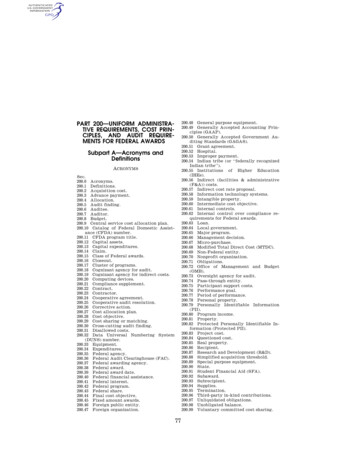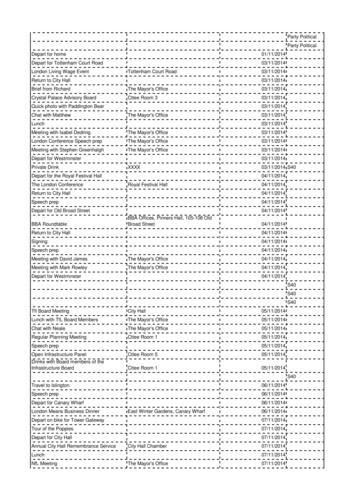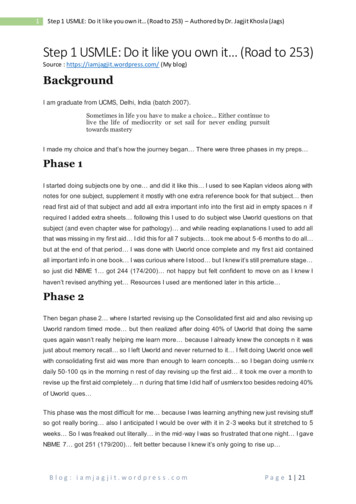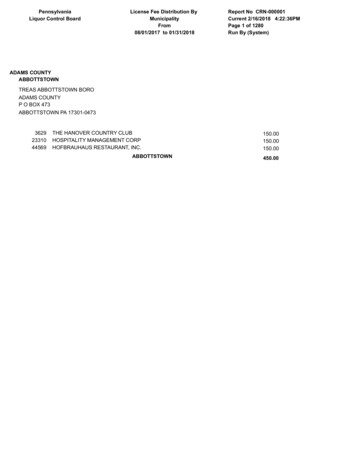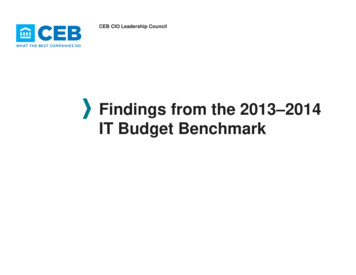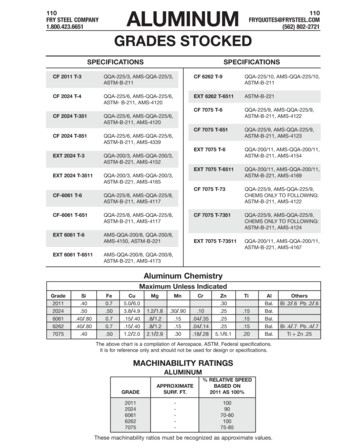
Transcription
2013/2014QS Global 200Business Schools ReportUnlocking the world’s top 200 business schools according to MBA employersNunzio Quacquarelli, MA Cambridge, MBA WhartonDanny Byrne, BA Oxford, MA University College London
www.TopMBA.com3IntroductionThe QS Global 200 Business Schools Report originated in theearly 1990s as an alternative to business school rankings.The ratings provide a detailed overview of the most popularbusiness schools around the world, based on details provided toQS by over 4,318 employers who actively recruit MBA graduates.Without inferring any overall rankings, QS’ objective is toprovide a resource to help prospective MBA students identifythe business schools from which employers most activelyrecruit. The research is intended to be of use to MBA employers,prospective MBA students and institutions worldwide that areinterested in international business education and recruitmenttrends.At the heart of the report is the definitive list of 200 business schoolsfrom which employers prefer to recruit MBAs. This list is compiledfrom an annual survey of human resources (HR) managers and linemanagers with recruiting responsibilities at companies around theworld. Each year, employers recommend new schools to be added tothe list. This is then sent to other recruiters to rate.Follow us
QS Global 200 Business SchoolsReport 2013/141.0Fast Facts
5www.TopMBA.com Five schools received the maximum score for employer recognition, identifyingthem as the leading schools in their region: Harvard and Stanford (NorthAmerica), INSEAD - France and London Business School (Europe), and INSEAD– Singapore (Asia-Pacific). Report highlights four distinct categories of business school in terms ofemployer recognition: Elite Global; Emerging Global; Elite Regional; EmergingRegional Of the 33 leading institutions to make the Elite Global category, 12 are from theUS. The other nations with Elite Global business schools are Canada (6), UK (3),Spain (3), Switzerland (2), France (2), Denmark (1), India (1), Ireland (1), Italy (1)and Singapore (1). Australia has no Elite Global business schools, despite having the thirdhighest number of global top-100 universities in the QS World UniversityRankings. The UK has just three, despite having four of the top ten universitiesin the world MBAs from Elite Global schools in North America earn more than those fromany other region. Salary bonus packages average US 123,239, slightly morethan the European figure of US 122,983 The school with the highest average graduate salary is Switzerland’s IMD(US 159,912), ahead of the US’s Stanford Graduate School of Business(US 156,265) Schools ranked for employer reputation in ten subject specializations. Harvardtops the table in five subjects, with five other schools top in one subject each:INSEAD, Kellogg, MIT Sloan, Stanford and WhartonFollow us
62013/14 QS Global 200 Business Schools Report Two Asian schools make the Elite Global category: INSEAD Singapore and IndianInstitute of Management, Ahmedabad Still no Elite Global schools in either Africa & Middle East or Latin America The top schools in Africa & Middle East for employer reputation are SouthAfrica’s University of Cape Town Graduate School of Business and University ofWitwatersrand, and American University of Sharjah Top Latin American schools are EGADE-Tecnologico de Monterrey, CampusMonterrey, Pontificia Universidad Católica de Chile, and Business School SaoPauloFollow us
QS Global 200 Business SchoolsReport 2013/142.0Business schoolcategoriesThis year’s report divides the world’s top 200 businessschools into four categories, based on their level ofinternational employer recognition.
82013/14 QS Global 200 Business Schools ReportElite globalElite Global business schools form an established cadre ofthe world’s very best business institutions. They are targetedby a wide range of employers, both domestically, regionallyand globally. Highly international, they typically admit onlyexperienced candidates with superior GMAT scores and allround credentials. Their name will transform the resume ofany candidate. MBAs will in many cases go on to be influentialbusiness leaders, and can expect to earn top salaries upongraduation.Emerging GlobalEmerging Global business schools have an established reputationfor excellence among employers that stretches well beyondtheir region. They attract high-quality candidates from all overthe world, and graduates can expect to earn highly competitivesalaries. Though in many cases they are newer and not as firmlyestablished as the ‘brand name’ institutions that make up theElite Global cluster, these institutions will in many cases aspire tobreak into the Elite Global group in years to come.Elite RegionalElite Regional institutions are well regarded by employers withintheir region, and may have started to develop a reputation furtherafield. Admitted students typically have strong credentials,though they may be slightly less experienced on average thanthose at Elite Global or Emerging Global institutions. EliteRegional institutions are often younger institutions that, havingestablished an excellent reputation among employers within theirregion, will be looking to establish their brand as one with a trulyglobal reach.Follow us
www.TopMBA.com9Emerging RegionalEmerging Regional institutions have established a solid reputationamong employers within their own country. They will appeal tocandidates with fewer years of professional experience, and graduatesalaries are on average more modest than those at Elite Regionalinstitutions. Having established a good reputation among domesticemployers, they will now be looking to increase their visibility amonginternational employers and students.In addition to these global groupings, the research provides ratings ofthe most popular business schools according to two definitive categories: Regional ratings: Africa and the Middle EastAsia-PacificEuropeLatin AmericaNorth America MBA specialization* ratings: Corporate social responsibility (CSR)EntrepreneurshipFinanceInformation managementInnovationInternational managementLeadershipMarketingOperations managementStrategy*MBA specialization refers to a business school’s perceived area of expertiseamong MBA employers. Throughout the report the above 10 areas of expertiseare referred to as ‘MBA specializations’.Follow us
102013/14 QS Global 200 Business Schools ReportRegional MBA ratingsManagement education is globalizing. The pastdecade has seen an increase of accredited businessschools open in emerging markets such as in theBRIC countries (Brazil, Russia, India, and China).While business schools in the US and Europe remainthe most popular study destinations among MBAstudents, schools elsewhere in the world such asthose in Asia-Pacific are growing in popularity. Theproliferation of accredited programs around theglobe has led to a wider choice for MBA applicantsover the past few years. Recent trends indicate thatthere is greater onus on choosing the right countryas well as the right business school. According tothe TopMBA.com Applicant Survey 2013, over 50%of MBA students are choosing schools based on thecountry in which they wish to work.Furthermore, international MBA recruiting is nolonger the domain of a few prestigious US andEuropean companies. A growing number of HRmanagers in the Asia-Pacific region, Latin America,and the Middle East are informed about MBAeducation. Managers in these regions have beenasked to share their views on the schools they wouldprioritize for MBA hiring.There is a greater focus on regional MBA trendsand in order to provide data to help students andrecruiters choose which schools to apply to andrecruit from, QS has categorized its business schoolratings by region.Follow us
www.TopMBA.com11MBA specialization ratingsAccording to the QS TopMBA Applicant Survey,school specializations are the eighth mostimportant criterion for school selection. Accordingto the survey, which is the largest of its kind, schoolspecializations are more important to applicantsthan MBA rankings, convenience of location, orrecommendations from peers, colleagues and evenemployers.The MBA curriculum is changing to respond tothis in the offering of MBA specializations. Forprofessionals who want to further their careers inthe field that they are already working in, an MBAwith a specialist focus would be a viable option.In developing ratings on MBA specializations, QS’aim is to provide a useful resource for prospectivestudents and employers’ alike to help aid decisionsover which schools to apply to, or which torecruit from. MBA programs that do not offerspecializations can still produce graduates thatexcel in specialist fields.The results of the QS Global 200 Business SchoolsReport are based on MBA recruiters’ opinions andas such, employers also voted on general MBAprograms that provide training and educationin any one of 10 specialist fields, as well asprograms that specialize in a particular field.There is now greater diversity in the many MBAspecializations on offer, but QS rates the 10 coreMBA specializations.Follow us
122013/14 QS Global 200 Business Schools ReportGlobal employability: business school rankings or ratings?The objective of the QS Global 200Business Schools Report is to providean indication of the employability ofan MBA upon graduation. As such, QSbelieves a ratings system as opposedto the traditional business schoolrankings provides a reliable measure ofthe employability outcome of an MBAprogram.Traditional rankings assess on average15 to 20 criteria in order to providean overarching indication of studentsatisfaction. These vary but are mostlybased on general aspects: academicpeer review, citations per faculty,faculty-student ratio, and internationalstudents, for example.The QS Global 200 Business SchoolsReport only measures one indicator –the employability outcome of an MBAprogram by region and specialization.Focusing solely on employers’ viewsprovide a reliable insight as to whichbusiness schools produce MBAgraduates and alumni that are favoredby recruiters. This is derived fromemployers’ votes as to which schoolsthey prefer to recruit MBA graduates.Follow usEmployers and HR decision makersworldwide are at the forefront ofwitnessing the worth of an MBA.QS believes that they are in the bestposition to judge the value of a businessschool’s graduates, and have among themost objective and informed opinionsas to which are the ‘best’ businessschools. When an HR department selectsa business school to recruit MBAsfrom, the decision will often be theresult of an intensive research exercise:evaluating the strength of faculty, thefacilities and the relevance of the courseto the employee and the company’sneeds.Similarly, when HR managers choosewhich business schools to recruit from,they will draw from a wide range ofinformation sources. They assess thequality and efficiency of the schools’career services and the reputation of theschool, for example. HR decision makerslook beyond rankings and examine thefacilities, the course content and thequality of students. Year-on-year, thissurvey reveals remarkable consistencyin school selection. Allegiance toparticular schools is not gained or lostby one good or bad student but by asustained experience over several years.
www.TopMBA.com13MethodologyThe QS Global 200 Business Schools Report survey (hereafter referredto as the ‘survey’) captures the preferred set of business schools eachresponding employer wishes to recruit from, either now, in the recentpast or in the near future.QS asks international employers to select the schools they consider forhiring MBA graduates from. Employers that focus on domestic hiringare not included in the survey. However, QS recognizes that manyexcellent schools that cater predominantly for their local recruitmentmarket may therefore not appear in the tables.We include only business schools offering full-time MBA programsand as such well-known business schools like ESCP Europe and HECLausanne (which only offer executive MBA, part-time MBA and/ormasters programs) are excluded.In order to produce the QS Global 200 Business Schools Report, QSfocuses on experienced HR and line managers at organizations thatactively recruit MBAs. Respondents from each company are askeda series of questions about MBA recruiting in the previous and theforthcoming year.Employer responses to these questions provide information on thefollowing: MBA recruitment trendsMBA salaries and compensation trendsGlobal business school ratings by regionGlobal business school ratings by specializationEach employer is asked to list, unprompted, the international schoolsfrom which they have recently attempted to recruit MBAs. Each timea school is selected by an employer, it receives one vote and the totalnumber of votes is referred to as the ‘total unprompted votes.’Follow us
142013/14 QS Global 200 Business Schools ReportFrom a list of 500 business schools that have been categorizedby region, employers are then asked to identify the schools theyregard as attractive for the purpose of hiring MBA graduates.In order to be included in the survey, a school must havebeen recommended by an employer in the previous year ofthe research. Each time a school is voted, it is given one vote,referred to as the ‘total prompted votes’.The prompted and unprompted votes are added together tocreate the ‘total employer votes’. In order to ensure balancedresults that are not subject to influence from the economiccycle, an average of the ‘total employer votes’ is taken from thecurrent year’s research and the previous two year’s research.The best performing school(s) are given an index score of 100and the average total employer votes is indexed against thebest performing school(s). This indexing does not affect therelative positions of schools in any given year. This score isknown as the school’s ‘index of employer votes’.This research does not intend to infer an overall ranking ofschools. The tables list schools in clusters, categorized byregion and specialization. The relative employer position ofschools is displayed based on their employer score in that yearand a rating within the region or specialization.Follow us
www.TopMBA.com15Rating the business schoolsThe table below provides a summary of the number of business schools in each region whichmake up the list of the QS Global 200 Business Schools Report. Schools that achieved anindex of employer votes of over 11 are included in the definitive list of 200 business schools.Schools are presented in clusters, which provide distinction in terms of recognition amongemployers. The relative positions within the clusters are not considered significant by theauthors of this report.Number of schoolsFeatured By RegionTop Cluster: Index ofEmployer Votes 652nd Cluster: Index ofEmployer Votes 233rd Cluster: Index ofEmployer Votes 144th Cluster: Index ofEmployer Votes 11North in America811Africa & Middle-East41Source: QS Global Business Report 2012-2013 (TopMBA.com)Follow us
162013/14 QS Global 200 Business Schools ReportSampleThe survey was conducted between March and July 2013 and represents one ofthe largest exercises QS has undertaken in terms of geographic scope and level ofdetail.The total 28,000 employer responses counted in 2013 included 4,318 who wereactively recruiting MBAs. All employers who responded to the survey areguaranteed confidentiality for the components of their individual responses, exceptfor any open-ended feedback they have chosen to provide on the value of an MBA orconcerns with MBA hires.* Comparative figures for the previous year are shown in brackets.The following table gives a snapshot of some of the organizations that took partin the survey across the world. A more comprehensive list can be found in theappendix at the end of this document.Follow us
17www.TopMBA.comSample of responding employers by region in 2013Asia-PacificAfrica & MiddleEastEuropeLatin AmericaUS & AIG Investments3MBenQKPMGDaewoo SecuritiesAkzoNobelGETowers WatsonGoldman SachsTATALGBooz & CompanyAmerican ExpressAbdul Latif Jameel(Toyota)ACSDeloitte ConsultingInvestec Bank LtdDelta GroupMicrosoftIBMJohannesburg StockExchangeAramcoSAPBCGCitibankBAE SystemsAlcatel-LucentA.T. KearneyBarclaysCarl Zeiss AGCognizantFrost & SullivanCredit SuisseE.ONGoogleLondon Consulting tt PackardTATA Consultancy ServicesJ.P. MorganCoca-ColaTelefonicaBain & CompanyBlackRockComcastIBMCapgeminiMorgan StanleyFordIntel CorporationNavigantPrudentialJohnson & JohnsonCiscoFollow us
182013/14 QS Global 200 Business Schools ReportIndustry distribution of employersThe chart below shows the spread of employers across 20 industries. This reflectsthe global spread of industries that hire MBAs. The consulting and professionalservices sector are the largest respondents in 2011, reflecting the surge in MBAdemand within this sector. Banking and financial services are the second largestresponding sector, followed by HR/recruitment services. Manufacturing, IT, FMCGand energy are also well represented in the sample.Aerospace / DefenceConstruction / PropertyConsulting / Professional ServicesElectronics / High TechnologyEnergyFinancial Services / BankingFMCGIT / Computer ServicesLawManufacturing / EngineeringMedia / Entertainment & ArtsMetals / MiningOtherPharmaceuticals / Biotech & HealthcarePublic Sector / Govt. / Non-profitRecruitment / HR servicesRetailTelecomsTransportation / DistributionTravel / Leisure / HospitalityUtilities0Follow us100200300400500
www.TopMBA.comAerospace / Defence21Construction / Property138Consulting / Professional Services567Electronics / High Technology129Energy143Financial Services / Banking379FMCG203IT / Computer Services281Law21Manufacturing / Engineering329Media / Entertainment & Arts58Metals / Mining104Other578Pharmaceuticals / Biotech & Healthcare157Public Sector / Govt. / Non-profit145Recruitment / HR services343Retail92Telecoms93Transportation / Distribution81Travel / Leisure / Hospitality65Utilities56Grand Total398319Source: MBA Jobs & Salary trends 2013Follow us
202013/14 QS Global 200 Business Schools ReportGeographical distribution of employersResponses were received from employers across the globe:Follow usAfrica & Middle East5%Asia Pacific29%Eastern Europe6%Latin America33%US & Canada6%Western Europe21%Grand Total100%
QS Global 200 Business SchoolsReport 2013/142013 QS Global200 BusinessSchool Ratings:Elite Globalbusiness schools
242013/14 QS Global 200 Business Schools ReportElite Global business schoolsElite Global business schools form an established cadre of the world’svery best business institutions. They are targeted by a wide rangeof employers, both domestically, regionally and globally. Highlyinternational, they typically admit only experienced candidates withsuperior GMAT scores and all-round credentials. Their name willtransform the resume of any candidate. MBAs will in many cases go onto be influential business leaders, and can expect to earn top salariesupon graduation.This year’s report shows that while Elite Global institutions remainclustered in North America and particularly the US, they are also presentacross Europe and to a lesser degree in Asia-Pacific. As yet there are noElite Global business schools in the Middle East and Africa, or LatinAmerica.Of the 33 leading institutions to make the Elite Global category, 12 arefrom the US. The other nations with Elite Global business schools areCanada (6), UK (3), Spain (3), Switzerland (2), France (2), Denmark (1),India (1), Ireland (1), Italy (1) and Singapore (1).Emerging Global business schoolsEmerging Global business schools have an established reputation forexcellence among employers that stretches well beyond their region.They attract high-quality candidates from all over the world, andgraduates can expect to earn highly competitive salaries. Thoughin many cases they are newer and not as firmly established as the‘brand name’ institutions that make up the Elite Global cluster, theseinstitutions will in many cases aspire to break into the Elite Globalgroup in years to come.There are a total of 73 Emerging Global schools worldwide. NorthAmerica leads with 27, ahead of Europe (20), Asia-Pacific (12), LatinAmerica (8) and Middle East & Africa (4).Follow us
www.TopMBA.com25Elite Regional business schoolsElite Regional institutions are well regarded by employers within their region,and may have started to develop a reputation further afield. Admitted studentstypically have strong credentials, though they may be slightly less experienced onaverage than those at Elite Global or Emerging Global institutions. Elite Regionalinstitutions are often younger institutions that, having established an excellentreputation among employers within their region, will be looking to establish theirbrand as one with a truly global reach.There are a total of 45 Elite Regional schools worldwide. North America leads with20, ahead of Europe (14), Asia-Pacific (9), Latin America (1) and Middle East & Africa(1).Emerging Regional schoolsEmerging Regional institutions have established a solid reputation amongemployers within their own country. They will appeal to candidates with feweryears of professional experience, and graduate salaries are on average more modestthan those at Elite Regional institutions. Having established a good reputationamong domestic employers, they will now be looking to increase their visibilityamong international employers and students.There are a total of 44 Emerging Regional schools worldwide. North America leadswith 22, ahead of Europe (10), Asia-Pacific (11) and Latin America (1).Follow us
QS Global 200 Business SchoolsReport 2013/14Top business schoolsby region:North America
2QS Global 200 Business Schools Report 2013/141. Elite ard Business SchoolUnited States100,07304344194123Stanford University Graduate School ofBusinessUnited States100,07294423539834The Wharton School, University ofPennsylvaniaUnited States99,97255354284546The University of Chicago BoothSchool of BusinessUnited States99,67155333557952The Kellogg School of Management,Northwestern UniversityUnited States99,67085403547765Columbia Business School, ColumbiaUniversityUnited States98,46705342921379UCLA Anderson School ofManagementUnited States94,170453334360813Joseph L. Rotman School ofManagement, University of TorontoCanada91,06734,5483131397Sloan School of Management,Massachusetts Institute of Technology(MIT)United States88,9710539383901010The Fuqua School of Business, DukeUniversityUnited States88,169054033432118Haas School of Business, UC BerkeleyUnited States85,2715537332401211University of Michigan, Ross School ofBusinessUnited States83,8703536305021316York University, Schulich School ofBusinessCanada77,3664550363451412Richard Ivey School of Business, TheUniversity of Western OntarioCanada76,0669531291331514Desautels Faculty of Management atMcGill UniversityCanada75,367055535701621HEC MontrealCanada72,3630737281131717Yale School of Management, YaleUniversityUnited States71,5717627352301818Queen's School of BusinessCanada71,266154032119Source: QS Global 200 Business Schools Report 2013/14 (TopMBA.com)Follow us
3www.TopMBA.comWhile in the past two years there has been a stable hierarchy of leading schools in NorthAmerica, this year’s results see a greater level of variation at the top of the table.Harvard retains the top spot, yet last year’s second-placed institution Kellogg School ofManagement drops to fifth, overtaken by Stanford, Wharton and Chicago Booth.Canadian school Joseph L Rotman is the biggest climber in the top ten, moving up five placesto eighth. The only school to drop out of the top ten this year is UC Berkley’s Haas School ofBusiness, which drops three places to 11th.A total of 18 schools from the region qualify for Elite Global status. The two new additionsare the University of North Carolina’s Kenan-Flagler Business School, and the MBA programat Canada’s University of Alberta. The US accounts for two-thirds of the Elite Global schoolsin the region, with 12 to Canada’s six.The top three schools are also the strongest in terms of students’ average GMAT scores,suggesting that there is a close match between the perceptions of employers and the bestqualified MBA students.However, the correlation is far less precise beyond the leading three. NYU Stern School ofBusiness is placed fourth for average GMAT scores but just 21st for employer recognition,with 17th-placed Yale School of Management and 11th-placed Haas School of Business alsoboasting among the highest average GMAT scores.In the case of NYU Stern, the New York City factor may help it to attract top candidates, whileBerkeley and Yale both have big-name pulling power. In contrast, Columbia, Rotman andFuqua all make the top ten for employer recognition yet have average GMAT scores of under700 – a benchmark reached or surpassed by 15 other schools.Follow us
4QS Global 200 Business Schools Report 2013/14Average salariesInstitutionAvg Salary onGraduation(USD)Avg MeanBonus(USD)% Employed3 MonthsAfterGraduationProgramLength(Months)Total TuitionFees (USD)Harvard Business School120000262167424112350Stanford University Graduate School of Business129692265739224119100The Wharton School, University of Pennsylvania120000285638321119472The University of Chicago Booth School of Business115079276808921117520The Kellogg School of Management, a Business School, Columbia University103453255499420121440UCLA Anderson School of Management10000022320802475180Joseph L. Rotman School of Management, University ofToronto8984813237821875000Sloan School of Management, Massachusetts Institute ofTechnology (MIT)11840622925942461440The Fuqua School of Business, Duke University112626277938022118000Haas School of Business, UC Berkeley9700020272802177096University of Michigan, Ross School of Business111047261118521116900York University, Schulich School of Business865878730941655900Richard Ivey School of Business, The University of WesternOntario9307810668901278280Desautels Faculty of Management at McGill University9000022000982080000HEC Montreal727765800711214200Yale School of Management, Yale University104147263188521114400Queen's School of Business625809495801282000Source: QS Global 200 Business Schools Report 2013/14 (TopMBA.com)Follow us
www.TopMBA.com5The top three schools for employer recognition and GMAT scores, Harvard,Stanford and Wharton also have the highest average salaries, underliningtheir dominance. Yet second-placed Stanford beats Harvard, with averagesalary-plus-bonus remuneration totaling an impressive US 156,235.McGill University’s Desautels Faculty of Management has the highestemployment rates, with 98% of graduates having secured jobs within threemonths of graduation – though at US 112,000, average remuneration is notquite as high as at the top US schools.Average salaries for MBAs from Elite Global schools in North Americastand at US 102,573, with an average bonus of 20,666 bringing thetotal package to around 123,239. This places them just ahead of MBAsgraduating from Elite Global schools in Europe, who earn average salaryplus-bonus packages of 122, 983.Though base salaries tend to be slightly lower than in Europe (US 102,573compared to US 107,432), North American graduates earn significantlyhigher bonuses, averaging US 20,666 compared to the European figure ofUS 15,551.Follow us
6QS Global 200 Business Schools Report 2013/142. Emerging ATScoreAvgYearsWork%Intern'l%FemaleClass Size1915Sauder School of Business, Universityof British ColumbiaCanada64,4646656261242020Thunderbird School of rn School of Business, New YorkUniversity (NYU)UnitedStates56,2720539353892231University of Alberta, Alberta MBAProgramsCanada53,260055642802325Kenan-Flagler Business School,University of North CarolinaUnitedStates49,6690536292902424Boston University School ofManagementUnitedStates48,0683537331472527Kelley School of Business, pper School of Business, CarnegieMellon UniversityUnitedStates38,2693532272032722Tuck School of Business at DartmouthUnitedStates36,9716536352802830University of Virginia Darden School ofBusinessUnitedStates35,9703534353202928McCombs School of Business, Univ. ofTexas at AustinUnitedStates35,7684525332613037Texas A&M University, Full-Time MBAProgram, Mays Business SchoolUnitedStates33,264953524663123S.C. Johnson Graduate School ofManagement, Cornell UniversityUnitedStates32,7700534302713244School of Business Administration,University of MiamiUnitedStates32,263832938883335McDonough School of Business,Georgetown y of Illinois Urbana-Champaign- Illinois MBAUnitedStates31,6650441261233536Georgia Tech College of ManagementUnitedStates31,367851331683626Goizueta Business School, EmoryUniversityUnitedStates30,868153723205Follow us
7www.TopMBA.com3732Vanderbilt University, Owen GraduateSchool of ManagementUnitedStates29,9682522351753867The Carroll School of Management,Boston CollegeUnitedStates28,7666431311033947Babson CollegeUnitedStates27,4630542291604042Hult International Business SchoolUnitedStates27,26106862922504138Florida International University,Chapman Graduate School of BusinessUnitedStates26,155534135854234Marshall School of Business, Universityof Southern CaliforniaUnitedStates25,7700519301794Weatherhead School of Management,Case Western Reserve UniversityUnitedStates24,061535242106434451John Molson Scho
Each year, employers recommend new schools to be added to the list. This is then sent to other recruiters to rate. Introduction. QS Global 200 Business Schools Report 2013/14 Fast Facts 1.0. www.TopMBA.com 5 Follow us Five schools received the maximum score for employer recognition, identifying them as the leading schools in their region: Harvard and Stanford (North America), INSEAD .


